|
This is my dynamic, frequently updated homepage. This is a NewsLog, also known as a WebLog or Blog.
Everything is evolving, so don't assume too much.
People to watch:
Adina Levin
Andrius Kulikauskas
Britt Blaser
Catherine Austin Fitts
Chris Corrigan
Clay Shirky
Dan Gillmor
Dave Pollard
David Allen
David Weinberger
Dewayne Mikkelson
Dina Mehta
Doc Searls
Elisabet Sahtouris
Elizabeth Lawley
Euan Semple
Florian Brody
Frank Patrick
Gen Kenai
George Dafermos
George Por
Graham Hancock
Greg Elin
Hazel Henderson
Heiner Benking
Inspector Lohman
Jean Houston
Jerry Michalski
Jim McGee
Jim Moore
John Abbe
John Perry Barlow
John Robb
Joi Ito
Jon Husband
Jon Lebkowsky
Jon Udell
Jonathan Peterson
Judith Meskill
Julian Elvé
Julie Solheim
Kevin Marks
Lawrence Lessig
Leif Smith
Letecia Layson
Lilia Efimova
Lisa Rein
Marc Canter
Mark Oeltjenbruns
Mark Pilgrim
Mark Woods
Martin Dugage
Martin Roell
Mary Forest
Matt Mower
Max Sandor
Michael Fagan
Mike Owens
Mikel Maron
Mitch Kapor
Mitch Ratcliffe
Nathalie dArbeloff
Netron
Noam Chomsky
Paul Hughes
Peter Kaminski
Phil Wolff
Philippe Beaudoin
Ray Ozzie
Raymond Powers
Rebecca Blood
Roger Eaton
Roland Tanglao
Ross Mayfield
Scott Lemon
Sebastian Fiedler
Sebastien Paquet
Skip Lancaster
Spike Hall
Steven Johnson
Stuart Henshall
Thomas Burg
Thomas Madsen-Mygdal
Thomas Nicholls
Timothy Wilken
Todd Suomela
Tom Atlee
Tom Munnecke
Tom Tomorrow
Ton Zijlstra
Lionel Bruel
Loic Le Meur
Nancy White
Mark Frazier
Merlin Silk
Robert Paterson
Colby Stuart
Nova Spivack
Dan Brickley
Ariane Kiss
Vanessa Miemis
Bernd Nurnberger
Sites to watch:
Electronic Frontier Foundation
Co-intelligence Institute
Free Expression Network
Collective Intelligence
Action without borders
Manufacturing Dissent
Explorers Foundation
Disclosure Project
ThoughtsOnThinking
Forbidden Science
Emergent by Design
Greater Democracy
Global Ideas Bank
Independent Media
Space Collective
Friendly Favors
Escape Velocity
Disinformation
Collective Web
WorldChanging
YES Magazine
Disinfopedia
NotThisBody
MetaFilter
Webcamorama
BoingBoing
Smart Mobs
Do No Harm
Imaginify
FutureHi
Openworld
Nanodot
HeadMap
Rhizome
Absara
Edge
Junto
French:
Emmanuelle
Manur
Elanceur
Loeil de Mouche
IokanaaN
Blog d'Or
Le Petit Calepin
GeeBlog
Absara
Guillaume Beuvelot
Ming Chau
Serge Levan
Jean Michel Billaut
C'est pas Mécanique

I live in Toulouse, France where the time now is:
01:08
Unique Readers:

Primarily
Public Domain
Everything I've written here is dedicated to the
Public Domain.

The quotes from other people's writings, and the pictures used might or might not be copyrighted, but are considered fair use. Thus, overall, this weblog could best be described as being:
Primarily Public Domain. |
Syndication:
 ![Validate my RSS feed [Valid RSS]](http://www.newciv.org/pic/valid-rss.png)
|
| Monday, December 30, 2002 |  |
|
|
|
 Something got me to start reminiscing about the history of the servers and websites I've been intimately involved with. Well, it is the end of the year, so I suppose it is appropriate. Something got me to start reminiscing about the history of the servers and websites I've been intimately involved with. Well, it is the end of the year, so I suppose it is appropriate.
I'm writing this in my weblog, which most people read at ming.tv, but which arises from the integrated NewsLog function of newciv.org - the New Civilization Network.
I had my first website in early 1994. It was served over ftp rather than http, because real web hosting was harder to come by. I called my website World Transformation, because that sounded like a good thing I'd be interested in, and I just listed some sub-interests and some links for each. Today it looks quite similar to back then, I'm embarrassed to say, which makes parts of it very outdated now. Later in that year I got an offer of free hosting on protree.com. At the time it turned out to be THE starting place for a bunch of alternative/metaphysical sites that later made it big, like Rene Mueller's SpiritWeb. Bob Garth who was running the server had just a 28.8 modem connection, but that worked perfectly fine in those days.
When NCN happened in early 1995, the thought was that there would be a bunch of decentralized servers, owned and operated by different people. Max Sandor started the first one, which he called "Server One". A 16MHz 386 running Slackware Linux. This too had an always on 28.8 modem for the net connection. Max took care of that for several years.
At some point I took that server over, and connected it to a new T1 connection in Venice, California, in the Global Solutions Center, later Synchronicity Networks office. Many more stories to tell about much of that. The hardware got replaced since then a few times. A total sequence of about 4 servers since 95 I think, although there have sometimes been several at the same time. Once, for several months, the servers lived in a plastic box on the parking lot by the beach in Venice, which was rather strange and risky. Somebody else had moved into the premises, but the T1 connection was still on, so we drilled a hole in the wall and led the cable out to that rubbermaid storage container, which was made for garden tools or something. Luckily nobody stole it. After that, the servers moved to Beverly Hills with the T1 line for another year or so, where I worked with Julie on the Oasis TV website and other things.
Nowadays there are luckily more options. I work out of my house and have a few servers here. The current main server is now located in Irvine, California, on a T1 line at the offices of one of my clients. NCN and my own sites are on it, as well as many other good non-profit sites such as Global Ideas Bank, International Society for the System Sciences, BagelHole, Spirit Rising, Richard Hawkins' Synergetic Geometry animations, Art of Living, Unity-and-Diversity Council, CyberSangha and probably many more I'm forgetting.
[ NCN | 2002-12-30 22:39 | | PermaLink ] More >
|
|
| Sunday, December 29, 2002 |  |
|
|
|
SmartMobs mentions these notes from a 2000 seminar on 'Clustering and Swarming as self-organising techniques in virtual communities', which is very interesting stuff. Specifically it talks about tacit knowledge and the fallacies involved with trying to manage and represent knowledge in any finite way. Hard to quote, because it is all good, but here, about what knowledge is:"If the problems are large in defining human organisations in a behaviouristic way then we have to go to language and culture in order to make sense of them. 'Information space', or the realm of legitimate knowledge inside the language and the culture is 'multidimensional' - which means it can be cut up in many different ways. The problem of attribution is a social one and at the microlevel comes down to value judgments. It can be looked at the macrolevel in terms of the collective sympathy or resistance which determines whether or not an idea is taken up. Knowledge management is therefore not really about 'managing' the knowledge or skills which people have within an organisation but in 'making sense' of why something happened and trying to influence the future by such intelligence." And here is an abbreviated version of the seven sins (mis-conceptions) of knowledge management:- That knowledge can be managed [Too tacit, dynamic and complex]
- That organisations can be 'designed' [Real organizations are too complex and organic]
- The myth of the rational agent [People are not just motivated by data]
- Utilitarianism [People don't always do what they do because they expect a return]
- A belief in Utopia [The real world isn't made of glib generalizations]
- A belief in 'best practice' [Circumstances change]
- The organisation is merely a collection of individuals [Optimized individuals might not make an optimized organization]
The comments are mine. Read the real text which is better. Then, here's an example from IBM of how to use tacit knowledge:"IBM now have a search engine called 'tacit' that can trawl the 'team rooms' on the intranet and pick up any key words that might give a clue to information on any current problem that they have. An e-mail is then sent requesting help and a task force can be quickly assembled. But privacy is respected in that only key words and not text are picked up. Also whether a person responds is up to them. If for example you are looking for an expert on 'story' you may not pick up David Snowden's but he gets informed that you are looking. If he knows that you are a person that's likely to steal his ideas he doesn't respond. If you're someone that he knows and trusts then he might phone. In a bureaucratic organisation the thief would prosper but in this kind of 'shadow' system he or she gets starved of the access to knowledge on which the exploitation depends." And, from a comment on SmartMobs, here are some ideas behind the company Tacit's products:- Most knowledge lives in people's brains.
- Most evidence of what each person knows lives in their email archives.
- Knowledge flowing is more important that knowledge filed away.
- Email archives provide opportunities for social network analysis (SNA) and social filtering.
- People hate filling in complex forms.
- People want control over sharing personal metadata (who I am and what I know).
Hm, lots of food for thought there. Essentially, rather than trying to constuct perfect structures for representing knowledge in some universally perfect way, mine tacit knowledge from more incidental information sources. Don't expect people to go and record it the right way themselves, but use indirect ways of figuring it out, based on what people do and say and who they interact with.
[ Knowledge | 2002-12-29 22:03 | 0 comments | PermaLink ]
|
|
|
|
 "The advantage of a free market is that it allows millions of decision-makers to respond individually to freely determined prices, allocating resources – labor, capital and human ingenuity – in a manner that can’t be mimicked by a central plan, however brilliant the central planner." --Freidrich von Hayek "The advantage of a free market is that it allows millions of decision-makers to respond individually to freely determined prices, allocating resources – labor, capital and human ingenuity – in a manner that can’t be mimicked by a central plan, however brilliant the central planner." --Freidrich von Hayek
Sounds terrific. I hope to see one some day.
[ Patterns | 2002-12-29 23:59 | | PermaLink ] More >
|
|
|
|
 I was watching a documentary on Jimmy Carter's presidency the other day. It is striking how he is such an intelligent and hardworking person, who's always trying to do what his heart tells him is the right thing to do, so he can act with integrity. And he accomplished some remarkable things both while he was president and after, in terms of brokering peace internationally. But at the same time he was one of the most unpopular and unsuccessful U.S. presidents ever, according to popularity polls during his presidency, lower than any previous president in history. Which points us to something very important which he didn't do. He didn't manage the public perception of him or the country or the world. He speaks in a boring monotone and doesn't pay much attention to public relations. So things go badly in the economy and in polls, because people don't have confidence that things are good. Whereas an actor like Ronald Reagan gave great speeches, and seemed confident and inspiring, so people responded accordingly. He mushroomed taxes and national debt more than any U.S. president every had, effectively nationalizing several trillion dollars worth of private property, while pretending that the government was being trimmed down. What mattered the most was the perception, not what actually happened. And fast forward to George W. Bush, and it is now ALL about perception. He's half illiterate, knew nothing about history or foreign policy, is a recovering alcoholic and cocaine addict, and has many other problems that other candidates would have been nailed for. Now it is no longer necessary to get all the details right, and in most situations it doesn't really matter much if the facts are all wrong. As long as the president is looking good, looking confident while he says the right things, and as long as there are a bunch of people supporting him who do likewise, it doesn't really matter if the only reason for bombing Iraq is to get at its oil business. Doesn't really matter if nothing much came out of the investigation of 9/11. Doesn't really matter if Bin Laden gets to go free for no good reason. Doesn't really matter that the U.S. is now more in debt than ever before, and that military expenditures are skyrocketing. All that matters is managing the confidence in the system as it is. I was watching a documentary on Jimmy Carter's presidency the other day. It is striking how he is such an intelligent and hardworking person, who's always trying to do what his heart tells him is the right thing to do, so he can act with integrity. And he accomplished some remarkable things both while he was president and after, in terms of brokering peace internationally. But at the same time he was one of the most unpopular and unsuccessful U.S. presidents ever, according to popularity polls during his presidency, lower than any previous president in history. Which points us to something very important which he didn't do. He didn't manage the public perception of him or the country or the world. He speaks in a boring monotone and doesn't pay much attention to public relations. So things go badly in the economy and in polls, because people don't have confidence that things are good. Whereas an actor like Ronald Reagan gave great speeches, and seemed confident and inspiring, so people responded accordingly. He mushroomed taxes and national debt more than any U.S. president every had, effectively nationalizing several trillion dollars worth of private property, while pretending that the government was being trimmed down. What mattered the most was the perception, not what actually happened. And fast forward to George W. Bush, and it is now ALL about perception. He's half illiterate, knew nothing about history or foreign policy, is a recovering alcoholic and cocaine addict, and has many other problems that other candidates would have been nailed for. Now it is no longer necessary to get all the details right, and in most situations it doesn't really matter much if the facts are all wrong. As long as the president is looking good, looking confident while he says the right things, and as long as there are a bunch of people supporting him who do likewise, it doesn't really matter if the only reason for bombing Iraq is to get at its oil business. Doesn't really matter if nothing much came out of the investigation of 9/11. Doesn't really matter if Bin Laden gets to go free for no good reason. Doesn't really matter that the U.S. is now more in debt than ever before, and that military expenditures are skyrocketing. All that matters is managing the confidence in the system as it is.
My point here is not the politics. Rather, the world seems to have gradually changed so it is more and more about the perception of what is going on, rather than what really is going on. It is a virtual reality. That is both good and bad. The bad part is that slick political and corporate rulers can use the mass media to create the picture of reality that they would like to create. The good part is that it is public opinion that really rules the world. It is what you and I think, and what you and I see, that makes a difference, if there are enough of us. Which means, you don't necessarily have to figure out how to be president, or how to run a billion dollar company, or how to own an army. You just need to figure out how to influence public opinion in a more useful direction. It is not controlled, only influenced or inspired. If most people in the world stopped voting for people who mislead them, while pursuing special interests; if most people in the world stop buying products from companies who don't have their best interest in mind - the power structures would change very quickly. And how it all looks is now more important than who owns what. If public opinion changes its mind, and starts believing in totally different structures, and SEEING different structures - that would be the new world order.
[ Politics | 2002-12-29 18:12 | | PermaLink ] More >
|
|
| Saturday, December 28, 2002 |  |
|
|
|
 The publishing world is giving itself a lot of extra work because it hasn't yet discovered stuff like Creative Commons. I was just contacted by a major book publisher that wanted to get permission to use something I've written in a book of theirs. Quite a few people have asked to use stuff I've written in books or articles or pamphlets, but usually it has been a friend thing of somebody calling me and asking if it is OK, and I say "Sure, use whatever you want", and I don't even keep track of it. So this was the first time it was a formal thing. First they contact me to be sure they can find me, and a few weeks later they send me forms to fill out and sign and get back to them. Actually it is a separate company doing all of this, as I assume they need to do a whole lot of it, so they contract it out. In this case, after several messages back and forth, and forms and so forth, it turns out that they were talking about something I didn't write. An old entry about LETS systems in Global Ideas Bank. It is on my server, and I did the database, but I don't administer it, and the content is aggregated by hundreds of different people who have sent it in. Which obviously is something that confuses traditional publishers. Btw they didn't even copy it - they paraphrased a few paragraphs, and left out the actual details. And they still felt they needed to ask for written permission to paraphrase two paragraphs. The biggest problem here is that copyright law tells them that everything is copyrighted (owned and restricted) by somebody, unless they specifically have been told otherwise. Creative Commons does it the another way around. You're told up front what you can use and how. The publishing world is giving itself a lot of extra work because it hasn't yet discovered stuff like Creative Commons. I was just contacted by a major book publisher that wanted to get permission to use something I've written in a book of theirs. Quite a few people have asked to use stuff I've written in books or articles or pamphlets, but usually it has been a friend thing of somebody calling me and asking if it is OK, and I say "Sure, use whatever you want", and I don't even keep track of it. So this was the first time it was a formal thing. First they contact me to be sure they can find me, and a few weeks later they send me forms to fill out and sign and get back to them. Actually it is a separate company doing all of this, as I assume they need to do a whole lot of it, so they contract it out. In this case, after several messages back and forth, and forms and so forth, it turns out that they were talking about something I didn't write. An old entry about LETS systems in Global Ideas Bank. It is on my server, and I did the database, but I don't administer it, and the content is aggregated by hundreds of different people who have sent it in. Which obviously is something that confuses traditional publishers. Btw they didn't even copy it - they paraphrased a few paragraphs, and left out the actual details. And they still felt they needed to ask for written permission to paraphrase two paragraphs. The biggest problem here is that copyright law tells them that everything is copyrighted (owned and restricted) by somebody, unless they specifically have been told otherwise. Creative Commons does it the another way around. You're told up front what you can use and how.
[ Knowledge | 2002-12-28 15:32 | 0 comments | PermaLink ]
|
|
|
|
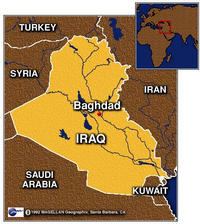 This fellow is apparently writing his weblog from Iraq. He doesn't quite seem to be a native, but it is nevertheless a good look into how it is to be there. This fellow is apparently writing his weblog from Iraq. He doesn't quite seem to be a native, but it is nevertheless a good look into how it is to be there."You learn to deal with the scheduled blackouts, you know when they are and for how many hours. But the last couple of days have been really bad. Very erratic, they turn it on and off whenever they like. We just freeze and thaw then freeze again. It has been very cold for the season and it is expected to get colder. The prices of kerosene heaters have gone thru the roof. There is a local factory, state owned, which manufactures these heaters, 130,000 Iraqi Dinars a pop. But buying one requires approval from the general manager. Don't ask. I can't figure why. It wouldn't be called bureaucracy otherwise.
Now take your newly acquired heater and stand in front of the company's building, someone will offer you 200,000 Iraqi Dinars for it within a minute. Look for it in the shops you will find it for 260,000 ID. That's free market economy isn't it? I decided it was cheaper to bring down an extra blanket." When NATO was bombing Beograd I was chatting with a Serbian friend there online, while it was happening and sirens were going off, etc. That really gives a different perspective on things. You can't just generalize a population into some abstract symbol of an enemy when you can actually talk with them and we're friends. I hope some more people in Iraq can be online.
[ Information | 2002-12-28 15:58 | | PermaLink ] More >
|
|
|
|
 Transcript of talk by Noam Chomsky on Taking Control of Our Lives: Freedom, Sovereignty, and Other Endangered Species. Much good historical stuff. For example, he says this about corporations: Transcript of talk by Noam Chomsky on Taking Control of Our Lives: Freedom, Sovereignty, and Other Endangered Species. Much good historical stuff. For example, he says this about corporations:A century ago ... corporations were granted the rights of persons by radical judicial activism, an extreme violation of classical liberal principles... They were also freed from earlier obligations to keep to specific activities for which they were chartered... Furthermore, in an important move, the courts shifted power upwards, from the stockholders in a partnership to the central management, which was identified with the immortal corporate person." And about who are the main enemies of (personal) freedom and (regional) sovereignty on the planet:"An array of mega-corporations, often linked to one another by strategic alliances, administering a global economy which is in fact a kind of a corporate mercantilism tending toward oligopoly in most sectors, heavily reliant on state power to socialize risk and cost and to subdue recalcitrant elements." Very well put. He goes on to describe very well how the current power structure in the world is not much more than a continuation of previous times where kings ruled and basically owned the kingdom, and all political, economic and legal structures were designed to keep it that way, and to keep the people from ever having any real power. The elites who own things are protected from the general population. Things are structured so that popular opinion is essentially irrelevant if it conflicts with the aims of the ruling elite."One striking example (there are many) has to do with the international economic order -- what are called trade agreements. The general population, as polls make very clear, is strongly opposed to most of what's going on but the issues don't arise. It's not an issue in the elections because the centers of power, the minority of the opulent, are unified in support of instituting a particular kind of socio-economic order. So therefore, the issue doesn't arise. The things that are discussed are things that they don't much care about. Like questions of character or questions of reform which they know that aren't going to be implemented. So that's what discussed. Not what people care about. And that's pretty typical and it makes sense on the assumption that the role of the public as the ignorant and meddlesome outsiders is just to be spectators." If the population actually starts organizing itself, it would ironically not be considered democracy, but more like a crisis of democracy. The kind of thing that riot police and press silence might calm down eventually.
[ Politics | 2002-12-28 16:38 | | PermaLink ] More >
|
|
| Friday, December 27, 2002 |  |
|
|
|
 My little daughter Nadia likes coming into my office to pretend she's me. So, she sits in my chair and gets this really deep voice: "I'm Mr.Flemming". And I ask "What are you doing Mr.Flemming?". I speak Danish to her, but she answers in English. "I'm working on my computer" she says. "Oh, but what are you actually doing on that computer?", I say. "Dot Com" she answers, with great conviction. I don't know where she picked that up from, but it's funny. And then she went and loaded an MP3 file. It is fascinating to see how the generations change, and later generations take things for granted that the earlier generation only learned about along the way. Nadia learned about e-mail first, so she also calls the stuff the mailman brings "e-mail". A cassette tape she calls a "CD". Film cameras don't make a lot of sense to her, and she's never seen a vinyl record or a rotary phone. She hasn't known a world without always-on Internet and digital cameras and cell phones for everybody. My little daughter Nadia likes coming into my office to pretend she's me. So, she sits in my chair and gets this really deep voice: "I'm Mr.Flemming". And I ask "What are you doing Mr.Flemming?". I speak Danish to her, but she answers in English. "I'm working on my computer" she says. "Oh, but what are you actually doing on that computer?", I say. "Dot Com" she answers, with great conviction. I don't know where she picked that up from, but it's funny. And then she went and loaded an MP3 file. It is fascinating to see how the generations change, and later generations take things for granted that the earlier generation only learned about along the way. Nadia learned about e-mail first, so she also calls the stuff the mailman brings "e-mail". A cassette tape she calls a "CD". Film cameras don't make a lot of sense to her, and she's never seen a vinyl record or a rotary phone. She hasn't known a world without always-on Internet and digital cameras and cell phones for everybody.
[ Diary | 2002-12-27 00:35 | | PermaLink ] More >
|
|
|
|
 Evolution on this planet has gone through many steps towards developing gradually more complex creatures. There seems to be a fractal nature to evolution, where for example stages that microbes pass through in a small scale are later repeated at higher levels of complexity. Young life forms will often irresponsibly try to use up all available resources, and will act aggressively against their neighbors, but later on in the cycle, as they become more mature, the various players will negotiate mutually beneficial arrangements amongst each other. The microbes are in many ways ahead of us complex humans in terms of figuring out how different kinds of beings can live together in peace, to everybody's mutual benefit. Evolution on this planet has gone through many steps towards developing gradually more complex creatures. There seems to be a fractal nature to evolution, where for example stages that microbes pass through in a small scale are later repeated at higher levels of complexity. Young life forms will often irresponsibly try to use up all available resources, and will act aggressively against their neighbors, but later on in the cycle, as they become more mature, the various players will negotiate mutually beneficial arrangements amongst each other. The microbes are in many ways ahead of us complex humans in terms of figuring out how different kinds of beings can live together in peace, to everybody's mutual benefit.
Even the most small and simple single celled organisms, bacteria, classified as monera, specialized themselves in amazing ways and organized themselves into complex social structures where they were supporting each other's existence. They specialized in breaking down different kinds of chemicals, and other bacteria would start using the chemicals the first produced, etc., forming a complete ecosystem. That was 1.7-3.7 billion years ago. These organisms then moved on to a higher level of cooperation. Multiple different kinds of creatures together formed a cell. These cells, which formed another kingdom called protista, were around a thousand times bigger than the monera. They were still single-celled, but we could say that they are multi-creatured, because they combine many previously separate creatures into one unit.
The protists, large multi-creatured cells, further evolved. At first they were prokariotes (before nucleus) and then they developed into eukariotes (cells with a nucleus). Eukariotes are now around a thousand times bigger than the prokariotes. Essentially they are very complex bacterial cooperatives, in many ways as complex as human cities, containing millions of specialized parts that would have been independent life forms in previous evolutionary steps. The nucleus of the cell is the information center, containing a DNA blueprint of how things are arranged.
Next step is that multiple nucleated cells combine into multi-celled creatures. And on and on to more and more complex multi-celled creatures, with more and more different specialized parts. Along the way death is invented, to make it easier to improve on the designs along the way, while recycling the old models.
Now, billions of years later, we humans have developed reflective intelligence, so we have the luxury of being able to sit and think about these things. But we are also rather ignorant about the complex social order that adds up to our existence. And we tend to be rather arrogant about it, even thinking that all these tiny creatures are nothing but a nuissance to us. Not realizing that our own bodies are amazingly complex cooperative organizations of billions of cells that each are complex organizations of millions of smaller specialized creatures. And all of it is pretty much working in perfect unison. And we humans tend to be so naive that we think that our conscious awareness is somehow in control of all of this, despite that we hardly understand it, and we mostly are totally unconscious of it.
Anyway, a question is what comes next, beyond us humans maturing into figuring out how we all can co-exist on the same planet. One quite logical thought would be that we all will arrange ourselves as components of a bigger organism of a higher order. That we'll be cells in the global brain, so to speak, and that humanity maybe will become conscious as a whole. Or, maybe other, more unexpected things will happen. Maybe parts of each of us will start cooperating with each other, and new kinds of life forms will emerge.
I'm no biologist. Better places to study some of this would be, for example the book Earth Dance - Living Systems in Evolution by Elisabet Sahtouris.
[ Nature | 2002-12-27 23:59 | | PermaLink ] More >
|
|
| Thursday, December 26, 2002 |  |
|
|
|
 Bawani, a small village in the Himalayas got transformed into an eco-village through better watershed management, by seeding different kinds of grass, and by learning to do things in different ways. Read the story. Everybody chipped in and worked as a collective to help make it happen, with some outside guidance. Now they no longer have to walk many miles for fodder for animals or wood for fuel, and they can grow fruit and vegetables next to their homes. Bawani, a small village in the Himalayas got transformed into an eco-village through better watershed management, by seeding different kinds of grass, and by learning to do things in different ways. Read the story. Everybody chipped in and worked as a collective to help make it happen, with some outside guidance. Now they no longer have to walk many miles for fodder for animals or wood for fuel, and they can grow fruit and vegetables next to their homes.
[ Inspiration | 2002-12-26 04:55 | 0 comments | PermaLink ]
|
|
|
|
ENN/Reuters: "U.S. greenhouse gas emissions linked to global warming fell by 1.2 percent last year, the largest decrease in a decade, due in part to slow economic growth and a milder winter, the government said recently. Last year's decline was in sharp contrast to the average 1.3 percent annual growth rate in U.S. emissions from 1990 to 2000 and was twice the level of the only other drop since 1990 — a 0.6 percent decline in 1991 — according to a report from the Energy Information Administration (EIA)..."
[ Nature | 2002-12-26 04:55 | | PermaLink ] More >
|
|
|
|
APP/ENN: "Microbes in the water may have a greater capacity to devour fuel waste than originally thought, a new study found, suggesting the harbor could cleanse itself within 20 years, barring any major fuel leaks, according to Derek Lovley, a microbiologist at the University of Massachusetts. [...] The key appears to be the presence of sulfate, a salt of sulfuric acid which is abundant in seawater, Lovley said. The microbes appear to use it as a substitute for oxygen, breaking down the waste in the same way humans use oxygen to break down their food."
[ Nature | 2002-12-26 04:55 | | PermaLink ] More >
|
|
|
|
According to The Guardian, the multi-national coffee and chocolate corporation Nestle is demanding a payment of $6m from the government of the world's poorest country, Ethiopia, which is in the middle of the worst famine in nearly 20 years. The money would be compensation for an Ethiopian business which was nationalized in 1975 by a previous military government. To put it in context, $6m could feed 1 million Ethiopians for a month. Nestle didn't even own that company, but years later they bought a German company, which used to have majority shares in it.
[ News | 2002-12-26 04:55 | | PermaLink ] More >
|
|
|
|
 Entry talks were recently completed in Copenhagen with 10 mostly ex-communist countries that soon will be joining the European Union. The countries are Hungary, Poland, the Czech Republic, Slovakia, Slovenia, Estonia, Latvia, Lithuania, Malta and Cyprus. I've never been sure whether the EU is a good or a bad thing - whether it removes unnecessary bureaucratic divisions and increases cooperation, or whether it becomes a bureaucratic big-corporation-lobbied central government. Junius has some interesting thoughts on how the new countries change the equation: Entry talks were recently completed in Copenhagen with 10 mostly ex-communist countries that soon will be joining the European Union. The countries are Hungary, Poland, the Czech Republic, Slovakia, Slovenia, Estonia, Latvia, Lithuania, Malta and Cyprus. I've never been sure whether the EU is a good or a bad thing - whether it removes unnecessary bureaucratic divisions and increases cooperation, or whether it becomes a bureaucratic big-corporation-lobbied central government. Junius has some interesting thoughts on how the new countries change the equation:"My take on this, for what it's worth, is that it gives the UK everything that lukewarm Europhiles/moderate Eurosceptics have always wanted. EU will now be so large and will vary so much in cultural and economic conditions that a thoroughgoing federalist project is dead in the water. The centre - Brussels and Strasbourg - will be fatally weakened vis-à-vis the component parts of the union because twenty-five (or more) states will find it almost impossible to reach agreement on anything but the most anodyne proposals. Moreover, the disparities in wealth within the zone mean that it will be much harder to impose anything like common standards in matters like employment and social security for the EU as a whole. Think about it: a common minimum wage for Germany, France and the UK might be a crazy proposal, but it isn't quite so crazy that there isn't someone who might suggest it. A common minimum wage for Latvia and the Netherlands: the most starry-eyed Euroenthusiast, even fortified by several glasses of champagne, isn't going to entertain the notion!"
[ Politics | 2002-12-26 04:55 | 0 comments | PermaLink ]
|
|
| Wednesday, December 25, 2002 |  |
|
|
|
First Local Government in the United States Refuses to Recognize Corporate Claims to Civil Rights: Bans Corporate Involvement in Governing.On the evening of December 9, 2002, the elected municipal officials of Porter Township, Clarion County -- a municipality of 1,500 residents an hour north of Pittsburgh in Northwestern Pennsylvania -- became the first local government in the United States to eliminate corporate claims to civil and constitutional privileges. The Township adopted a binding law declaring that corporations operating in the Township may not wield legal privileges - historically used by corporations to override democratic decisionmaking -- to stop the Township from passing laws which protect residents from toxic sewage sludge.
The actions by Porter Township thus repudiate the history of state and federal public officials restricting the rights of citizens while expanding the rights of corporations and their owners. ... (more) From Ending Corporate Governanance. Found at wood s lot
[ Politics | 2002-12-25 00:33 | 0 comments | PermaLink ]
|
|
|
|
 The biggest obstacle blocking the emergence of a free and peaceful world is in my opinion the legal concept of a corporation. It is, in principle, very easily removed, as it is only a legal fiction in the first place, and not any naturally occuring 'god-given' phenomenon or right. Corporations only exist because there are laws saying that they can. In practice it will be very hard to change, exactly because the current corporations can put vast resources to use in protecting and expanding their own power. The biggest obstacle blocking the emergence of a free and peaceful world is in my opinion the legal concept of a corporation. It is, in principle, very easily removed, as it is only a legal fiction in the first place, and not any naturally occuring 'god-given' phenomenon or right. Corporations only exist because there are laws saying that they can. In practice it will be very hard to change, exactly because the current corporations can put vast resources to use in protecting and expanding their own power.
People should certainly be able to organize themselves and operate as a group or organization. But a corporation is something else. A corporation is allowed the rights of a natural person. However, it has responsibilities and liabilities less than a natural person. And it can live eternally.
These things can be useful and sensible when it is a small group of people who are trying to operate a business activity together. The initial people don't have to be too worried about being personally liable for the potential failure of the business, and the business can open a bank account for itself, and it can be continued even if the original participants drop out for some reason.
But when it grows bigger, there are certain key design features that start to become prevalent. A corporation is controlled by very few people, but the fuel is provided by a great many people, in the form of investments and manpower.
A large corporation might have the will of one person, carrying out one person's plans, and it has the legal right to act in most arenas as one legal person, but it might have the manpower of 100,000 people, and available resources bigger than those of a small country. All in the hands of a handful of people who don't have any personal liability for what the corporation does.
It is very difficult to successfully convey what a horribly bad idea that is. Most of us are so used to the idea of corporations, and most of us have bought the propaganda that they're inextricably linked to free markets. Nothing could be further from the truth. Large multi-national corporations are the anti-thesis of free markets. They are the communist revolution you never even noticed happening.
[ Politics | 2002-12-25 03:26 | | PermaLink ] More >
|
|
|
|
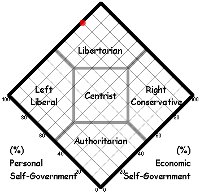 I sort of considered myself libertarian. But then there is this libertarian who was running for office somewhere and who for some reason was e-mailing me his various statements and letters to the editor, etc. And when I finally got around to looking at them, I realized I disagreed with a lot of he was saying. Anti-environmentalist, pro-corporate kinds of views. When I wrote to him, to ask to get off his list, and I told him he sounded more like a religious right republican than a libertarian, he wrote back with some surprise, saying that he scored 100-100 on the libertarian quiz and that he agreed with 100% of the libertarian party platform. I sort of considered myself libertarian. But then there is this libertarian who was running for office somewhere and who for some reason was e-mailing me his various statements and letters to the editor, etc. And when I finally got around to looking at them, I realized I disagreed with a lot of he was saying. Anti-environmentalist, pro-corporate kinds of views. When I wrote to him, to ask to get off his list, and I told him he sounded more like a religious right republican than a libertarian, he wrote back with some surprise, saying that he scored 100-100 on the libertarian quiz and that he agreed with 100% of the libertarian party platform.
So, I figured I've better take that test and re-evaluate things a bit for myself. It is actually a rather good test, based on a more sensible political spectrum than the normal left-undecided-right thing. There are some important dimensions missing, which I'll get to in a moment, but it does make things more clear. The idea is that the Liberal Left wants people to be free when it comes to their personal behavior (but wants to control their money), and the Conservative Right wants people to be free when it comes to money (but want to control people's behavior and morals). An Authoritarian wants to control all of it, and a Libertarian wants people to be free both when it comes to money and personal morals.
[ Politics | 2002-12-25 18:41 | | PermaLink ] More >
|
|
| Tuesday, December 24, 2002 |  |
|
|
|
 Merry Christmas! Merry Christmas!
Glædelig Jul!
The picture is from last winter, having a picturesque time in Denmark. Fresh snow was falling almost every day, which was rather lucky, and perfect for feeling in a christmas mood. We were visiting some in-law family out in the country, in Fuglebjerg (Bird Mountain), living in a farm house, with horses. We barely got the car back out of there again, as another 15cm of snow fell while we were inside for coffee.
[ Diary | 2002-12-24 04:01 | | PermaLink ] More >
|
|
| Monday, December 23, 2002 |  |
|
|
|
 Timothy Wilken writes: Timothy Wilken writes:"Today, mind and brain scientists have made enormous progress in understanding how the human brain works. There has been many surprises in these recent advances. But the biggest shocker is that the brain doesn't decide what to do. Decision making is not controlled centrally in the brain. The mind-brain appears to act as a coordination and consensus system for all the cells, tissues, and organs in the body. The brain doesn't decide to eat. The cells of the body decide to eat, the brain coordinates their activity and carries out the consensus will. Our human brain stores the gathered information from the body's sensing of its environment, the brain presents opportunities for action reflective of both the sensing of environment and the needs and goals of the 40,000,000,000,000 cells it serves. The brain is not the leader of the body, it is the follower of the body. It is a system that matches needs in the body with its sensing of opportunities to meet these needs by action within the environment. The brain is a 'government' that truly serves its constituents– the cells, tissues, and organs that make up the human body. The apparent " I " is not real. It is really a " We ". ... If the human body can using unanimous rule democracy and synergic consensus can organize and coordinate the actions of 40 trillion cells so totally that we identify the whole organism as a single individual, then we humans should be able to use these same mechanisms to organize our species and solve our human problems..."
[ Knowledge | 2002-12-23 03:17 | | PermaLink ] More >
|
|
|
|
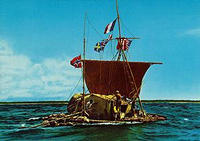 Buckminster Fuller defining wealth: Buckminster Fuller defining wealth:"Wealth is the performance per pound utilization of the world's resources. It is the number of forward days that the number of people on earth can live at an increasingly higher standard of living without the negative effects of environmental pollution." Here's another version:"Intellect and energy; measured by the amount of forward days for how many humans with which we are technically organized to cope. Because energy can neither be destroyed nor created, and 'know-how' of intellect can only increase with each experiment, or experience, wealth consisting of both the physical and metaphysical can only increase with each and every re-employment."
[ Knowledge | 2002-12-23 04:08 | | PermaLink ] More >
|
|
|
|
USA
1. Honeywell (rockets, chemical)
2. Spectra Physics (chemical)
3. Semetex (rockets)
4. TI Coating (atomic, chemical)
5. Unisys (atomic, chemical)
6. Sperry Corp. (rockets, chemical)
7. Tektronix (rockets, atomic)
8. Rockwell (chemical)
9. Leybold Vacuum Systems (atomic)
10. Finnigan-MAT-US (atomic)
11. Hewlett-Packard (atomic, rockets, chemical)
12. Dupont (atomic)
13. Eastman Kodak (rockets)
14. American Type Culture Collection (biological)
15. Alcolac International (chemical)
16. Consarc (atomic)
17. Carl Zeiss - U.S (chemical)
18. Cerberus (LTD) (atomic)
19. Electronic Associates (rockets)
20. International Computer Systems (atomic, rockets, chemical)
21. Bechtel (chemical)
22. EZ Logic Data Systems, Inc. (rockets)
23. Canberra Industries Inc. (atomic)
24. Axel Electronics Inc. (atomic)
Britain
1. Euromac Ltd-Uk (atomic)
2. C. Plath-Nuclear (atomic)
3. Endshire Export Marketing (atomic)
4. International Computer Systems (atomic, rockets, chemical)
5. MEED International (atomic, chemical)
6. Walter Somers Ltd. (rockets)
7. International Computer Limited (atomic, chemical)
8. Matrix Churchill Corp. (atomic)
9. Ali Ashour Daghir (atomic)
10. International Military Services (rockets) (owned by the British Ministry of Defence)
11. Sheffield Forgemasters (rockets)
12. Technology Development Group (rockets)
13. International Signal and Control (rockets)
14. Terex Corporation (rockets)
15. Inwako (atomic)
16. TMG Engineering (chemical)
17. XYY Options, Inc (atomic) And so on and so on and so on. Who sold what to Iraq, as contained in the Iraqi arms declaration, brought to you by Andreas Zumach of Die Tageszeitung. The article also lists French, Chinese, Russian, Japanese, Dutch, Belgian, Spanish and Swedish companies. Zumach's articles are available in English here, in the original at taz.de; and there's an interview with Zumach at Democracy Now! [from randomWalks]
[ Politics | 2002-12-23 16:05 | | PermaLink ] More >
|
|
|
|
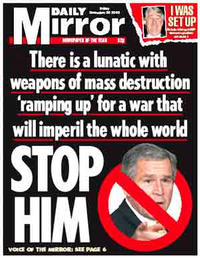 "Canadians to lead weapons inspection team into USA. "Canadians to lead weapons inspection team into USA.
A coalition of Canadian peace groups today announced their intention to send an international team of volunteer weapons inspectors into the United States later this winter. The coalition, Rooting Out Evil, is recruiting inspectors through their newly launched website, www.rootingoutevil.org.
"Our action has been inspired by none other than George W. Bush," said Christy Ferguson, a spokesperson for the group. "The Bush administration has repeatedly declared that the most dangerous rogue nations are those that:
1) have massive stockpiles of chemical, biological, and nuclear weapons;
2) ignore due process at the United Nations;
3) refuse to sign and honour international treaties; and
4) have come to power through illegitimate means.
"On the basis of President Bush's guidelines, it is clear that the current U.S. Administration poses a great threat to global security," said Ferguson. "We're following Bush's lead and demanding that the U.S. grant our inspectors immediate and unfettered access to any site in the country - including all presidential compounds - so that we can identify the weapons of mass destruction in this rogue state," added David Langille... "
[From an e-mail quoted by Spiritseeker]
[ Politics | 2002-12-23 16:05 | | PermaLink ] More >
|
|
|
|
Posted by shelala on weeno.com, some points of good advice on spotting when a person is lying to you:
1. No eye contact. His eyes will look away. If the room has a means of egress - that's where they'll look.
2. Crossing of arms and/or legs (a protective instinct).
3. The pupils of the eyes will narrow. Lying is stressful.
4. Hands on the face, especially the mouth. They are "covering" the lie.
5. Talking fast. A liar wants to get it over with.
6. Sometimes the head will nod a "no" when answering a "yes" question or visa versa. This is a subconcious movement.
7. Mispronouncing the words or mumbling. A liar kinda thinks he is not lying when he pronounces words incorrectly or mumbles.
8. Overstated friendliness/laughing. He wants you to believe and he wants you to like him so you will believe him. And I'd say those are correct. The way I see it, you'd be looking for whether there is congruency between what the words say and what the person's body says. The body is typically much more truthful than the words. None of those signs will say for sure, as there might be many other reasons for being nervous or not meaning what one says. And it only works on people who aren't trained in being good liars. Politicians being a good example. So, it works for O.J. Simpson, but not for George W. Bush.
[ Patterns | 2002-12-23 22:25 | | PermaLink ] More >
|
|
| Sunday, December 22, 2002 |  |
|
|
|
 The photo on the right is by Leonard Nimoy, aka Mr. Spock. Arcticle on salon.com about his love for photographing naked women. The photo on the right is by Leonard Nimoy, aka Mr. Spock. Arcticle on salon.com about his love for photographing naked women.
But that wasn't really my point. I'm trying to practice thinking like an entrepeneurial capitalist, so I'm looking for grassroots things people do to set up businesses. If you go to Google and look up "naked women", the first site you get is this site, which has no naked women at all, but it is a little joke page, with a button you can't quite seem to get to click on. And the programmer's page is linked in small print way at the bottom. My point is, he's probably making good business just from that one little link.
But it is better to do something actually useful. See Gizmodo. It is a site for gadget freaks. Everything cool and new in electronic gizmos, information and reviews, in a pleasant and neutral format. But there are some links for being able to buy some of the stuff too. From what I hear those guys are doing well with that. On the order of paying somebody $1K/month for doing writing, and bringing in $5K/month in commissions from the online stores they send people to. Perfect. Everybody's happy.
Several people figured out that they could make a list of the top books mentioned most often in the thousands of weblogs updated recently. Nice service. Shows where people's attention are. But it is also a great little way of making some extra money without anybody having any problem with it. See, the people who compile those lists (using automated programs) will also add their own amazon.com affiliate code to all the links, which means they will get a percentage of any purchases of those books. That certainly doesn't bother anybody.
I use that too if I link to books at Amazon. So, if you right now go and pre-order your new Segway Scooter for 2003 delivery, I'll get a nice commission. Order one for me too now you're at it.
[ Inspiration | 2002-12-22 23:56 | | PermaLink ] More >
|
|
|
|
Doc Searls, answering Eric Norlin who was ranting against all the new agey hippie webloggers who think that there is something inherently free and socially just and evolutionary about the Internet, and who himself seemed to think the Net is just like anything else: about making money and whatever other self-gratifying activities people are already into.
Doc: "Well, I guess I'm one of those NewAgers, but I'm an OldAger too, and the crank in me agrees completely. The Net is a new world. You can do all kinds of stuff on it, and with it. ALL kinds. Exclude nothing, because it'll happen. Worlds are like that.
About making money. Ever asked yourself what the business model of rocks is? Of dirt? Of trees? Of rotted plants? Of reproductive urges? Last I looked the building, concrete, lumber, oil and porn businesses were doing pretty well. The difference with the Net is: its resources are infinite. They don't need to be renewed, because they're not scarce. You mine and harvest them by processes like duplication. Take all you want; just don't buy the illusion that you "own" any of it. You don't, any more than you own the air you breathe or the jillion-ton wedge of rock and lava between your yard and the core of the Earth. Deep down, it's a commie kinda place. Deal with it.
Think of the Net as a laboratory for human nature, because it's the first world entirely made by human beings. And as Craig Burton says, we've only begun to terraform it. It's like we created a parallel planet, occupying the same space and time as the one we already inhabit. We're there already and have to make the most of it. Including the fact that some of our founding dreams were wet."
[ Organization | 2002-12-22 23:56 | | PermaLink ] More >
|
|
|
|
The most linked article in weblogs today is Coffee, Tea, or Should We Feel Your Pregnant Wife’s Breasts? at Kuro5hin. It is presented as a tale of some ordinary decent people who get grossly mistreated in an airport by a fascist police state, for no reason at all, and he gets thrown in jail and she develops complications in her pregnancy. Well, I read it, and I'd otherwise be the first to complain about the violations of human liberty and rights to privacy going on in the United States right now. But, even reading the guy's own account, it sounds more like a self-centered macho guy with a big anger problem.
The security checks at U.S. airports are very annoying, and it is very questionable if they'll make much difference in hindering terrorist attacks. I made the mystake myself of flying to Las Vegas recently from L.A., rather than driving. Each way they twice pulled me aside to meticulously go through everything I was carrying and wearing. Taking off my shoes, patting over my body, locating my nail clipper, etc. It might or might not all make sense, but there's a point to it, and it certainly wasn't the personnel at the gate who came up with those policies. And everybody's a bit on edge. So, the very wrong thing to do is what that guy did. Refuse to take your hat off, because you can't see why you should have to. When they find the scissors in your bag, and they point out that you aren't allowed to bring scissors, you jump up and yell "What the fuck! What kind of shit is that?!?" Yeah, that'll help. And when your pregnant wife is crying after having gone through the same thing, you don't comfort her, but you stomp over and try to start a fight with the people who had checked her. The result is very predictably that they'll take you away in handcuffs, but that they'll later look quite leniently on it after things have calmed down, and it was obvious that you were being protective of your pregnant wife who was vulnerable, and you for some reason didn't understand what was expected of you. It has nothing to do with whether your rights are violated because somebody has the audacity to think you might have a bomb in your hat or around your waist or under your skirt or in your shoe. Indeed, it is people like you who are most likely to think they have a reason to. People who carry anger with them wherever they go.
[ Politics | 2002-12-22 23:59 | | PermaLink ] More >
|
|
| Saturday, December 21, 2002 |  |
|
|
|
 While discussing xpertweb, an interesting system for connecting people with experts through a peer economy, Britt Blaser mentions, amongst several problems with real-world reputation systems: While discussing xpertweb, an interesting system for connecting people with experts through a peer economy, Britt Blaser mentions, amongst several problems with real-world reputation systems:"People no longer work for a living. They hold jobs for a living, which pays better. ..which sort of got me thinking. That isn't just a flippant thing to say. I have a hard time thinking of anybody who really works for a living. When I have work that needs doing, I have a hard time finding anybody who would like to do it, even for money. And, I must admit, I don't really have time to work either. There's nothing I'm available for that you can just come and pay me for and I'll do it. And, looking around me, a lot of people seem to work that way. OK, I can still go and get a haircut and pay for it, and I pretty much know what I'll get. But that kind of thing is becoming more rare.
The times I have been employed by corporations I was always puzzled by the fact that most people weren't really doing anything terribly productive, and it made relatively little difference what amount of work people actually were putting out. I several times had the task of making a computer system that would automate what a certain company was doing, so I specifically had to study what it was that actually took place. And along the way I noticed how rather little it had to do with doing work and accomplishing finished work. For example, it is with some embarrassment I note that I once hired a guy to document a program I had written. He had an impressive resume, and the company had to pay above the norm to acquire him. After a year he left to join a big consulting company, and everybody shook his hand and congratulated him on his great career move and his excellent service to the company. I and everybody else knew, at least via our peripheral vision, that the tangible product of his 1 year of work was 1/2 written page of a suggested outline for the manual. We're talking about an expense of maybe $70K for 1/2 page of writing, which I could just as well have jotted down in five minutes instead of hiring him. But nobody cared, because none of it really matters that much. The company was busy and the organizational chart looked good and the money flowed somehow. And this guy had great relationships with everybody. He was very supportive. I enjoyed working with him.
It is not all crazy. The point is that it is relationships people want, rather than giving or receiving quantities of work. And in some mysterious way, that's actually working. With the people I work for today, I'm an independent contractor, but I've insisted on arrangements where I get paid fixed amounts of dollars per month, but I don't promise any hours of work, and there are no deadlines or anything like it. If they or I are unhappy, we'll change the amount or stop the agreement. But it is not about work. It is about paying attention. It is about being present for whatever comes along in a certain area.
I have not yet myself learned to be comfortable with that in situations where I'm the person who's needs some work done. I can see how it ought to work, but it just hasn't become intuitive yet for me. The point is of course that it needs to be a mutually beneficial relationship. I pay attention to these things, and you pay attention to those things, and together we're better off somehow. It is not about me forcing you to deliver certain goods at a certain price. The world is changing rapidly and the future is uncertain, so maybe the relationship model is more viable than a transaction model. But, of course, it needs to be a good relationship, not a bad one.
[ Organization | 2002-12-21 23:59 | | PermaLink ] More >
|
|
|
|
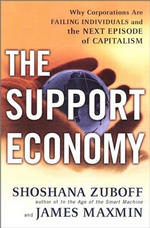 The Publishers Weekly review of the book "The Support Economy: Why Corporations Are Failing Individuals and The Next Episode of Capitalism" says: The Publishers Weekly review of the book "The Support Economy: Why Corporations Are Failing Individuals and The Next Episode of Capitalism" says:"Over the last two centuries, they argue, an increasingly efficient economy, coupled with a rise in democratic thinking and growing access to information, has opened up life's possibilities to increasing numbers of people. Because participation in the consumption-based economy is unavoidable, the general public looks to markets to provide 'deep support' in their quest for individualization, but 'are routinely punished for being complex psychological individuals in a world still fitted out for the old mass order.' This macroeconomic structure treats people as either employees or consumers and inevitably hurts their feelings. Zuboff and Maxmin would eliminate the 'little murders' of customer service interaction by replacing the current transaction-based model with a form of 'distributed capitalism' based on a customer-supplier relationship, so semi-anonymous customer service reps will be replaced by 'advocates' fully emotionally involved in their clients' needs." I like that. Its gotta happen. The economic value of actually caring about giving people what they want - it must somehow turn out to be higher than the value of tricking or mistreating people into paying too much for things they don't really want. Sooner or later.
[ Organization | 2002-12-21 23:59 | | PermaLink ] More >
|
|
|
|
On the xpertweb site you find a manifesto aimed at providing "Value Chains for the Rest of Us". To explain:"Value Chains are the means by which originators get rich in a market economy — they are combinations of producers, distributors, middlepeople and retailers.
Value Chains have always been hard to forge, defend, manage and collect from, which is why they're so profitable. The Internet is poised to combine productive individuals into value chains which reward their participants as richly as traditional value chains." OK, I get it. Anyway, read the actual document. Much good stuff like:"The Internet is a conversation.
And that Markets are conversations, as described by the folks at ClueTrain.
Work and its Reward is primarily a conversation about quality: money is just the punch line.
The quality of the work-reward conversation, not money, is the best benchmark for a 'New' Economy.
Internet protocols are the best model for a quality-based, more even-handed Economic Operating System.
Establishing a quality-based Economic OS requires no new laws, technical standards or protocols, so it needs nobody's permission..."
[ Organization | 2002-12-21 23:59 | 0 comments | PermaLink ]
|
|
|
|
Andrius Kulikauskas and David Ellison-Bey have many thoughts in this paper about economies based on giving.
"Wealth is relationships. In what sense is this true? If you have relationships, then you can get a loan, an education, a job, timely ideas, opportunities. Whereas knowledge is worthless out of context. Even money is worthless if there is nobody to take it, that is, if there is no web of relationships to back up the currency.
If you are poor, then you lack relationships, you must be 'out of the loop'. But if we can bring you 'into the loop', help you form social connections, integrate you into the economy, then we are creating wealth. This suggests that a business might sustain itself, fight poverty and create wealth by integrating people into the economy...
[ Organization | 2002-12-21 23:59 | | PermaLink ] More >
|
|
<< Newer stories Page: 1 ... 76 77 78 79 80 ... 97 Older stories >> |
|

This is a collage of things that catch my eye, things that need to be said, and stuff I really care about
TRUTH
BEAUTY
FREEDOM
LOVE
TECHNOLOGY
|
| Mon | Tue | Wed | Thu | Fri | Sat | Sun |
|---|
|
|
|
|
|
|
1 |
| 2 |
3 |
4 |
5 |
6 |
7 |
8 |
| 9 |
10 |
11 |
12 |
13 |
14 |
15 |
| 16 |
17 |
18 |
19 |
20 |
21 |
22 |
| 23 |
24 |
25 |
26 |
27 |
28 |
|
|




